
Shantiniketan is a neighbourhood of Bolpur city in Bolpur subdivision of Birbhum district in West Bengal, India, approximately 152 km north of Kolkata. It was established by Maharshi Devendranath Tagore, and later expanded by his son Rabindranath Tagore whose vision became what is now a university town with the creation of the Visva-Bharati University.

Visva-Bharati University is a public research central university and an Institution of National Importance located in Santiniketan, West Bengal, India. It was founded by Rabindranath Tagore who called it Visva-Bharati, which means the communion of the world with India. Until independence it was a college. Soon after independence, in 1951, the institution was given the status of a university and was renamed Visva-Bharati University.

The Bengali Renaissance or simply Bengal Renaissance, was a cultural, social, intellectual and artistic movement in Bengal region in the eastern part of the Indian subcontinent during the period of the British Indian Empire, from the nineteenth century to the early twentieth century dominated by Bengalis.
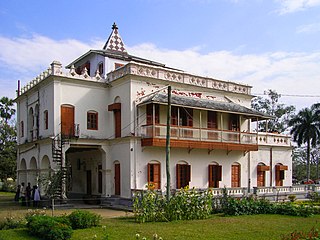
The works of Rabindranath Tagore consist of poems, novels, short stories, dramas, paintings, drawings, and music that Bengali poet and Brahmo philosopher Rabindranath Tagore created over his lifetime.

Bengali literature denotes the body of writings in the Bengali language. Bengali has developed over the course of roughly 1,300 years. The earliest extant work in Bengali literature is the Charyapada, a collection of Buddhist mystic songs dating back to the 10th and 11th centuries, and considered to be written in an ancestor language of Bengali, Assamese, Odia and many other languages belonging to the Eastern branch of the Indo-Aryan languages. The timeline of Bengali literature is divided into three periods − ancient (650-1200), medieval (1200-1800) and modern. Medieval Bengali literature consists of various poetic genres, including Hindu religious scriptures, Islamic epics, Vaishnava texts, translations of Arabic, Persian and Sanskrit texts, and secular texts by Muslim poets. Novels were introduced in the mid-19th century. Other than the Eastern Nagari script, Bengali has been written with different scripts such as the Perso-Arabic and Sylheti Nagri in certain parts of history. Nobel Laureate Rabindranath Tagore was the best known figure of Bengali literature to the world. Kazi Nazrul Islam, notable for his activism and anti-British literature, was described as the Rebel Poet and is now recognised as the National poet of Bangladesh.

Rabindranath Tagore is a 1961 black-and-white documentary directed by Indian director Satyajit Ray on the life and works of noted Bengali author Rabindranath Tagore. Ray started working on the documentary in the beginning of 1958 and it was released during the birth centenary year of Rabindranath Tagore, who was born on 7 May 1861. Ray avoided the controversial aspects of Tagore's life in order to make it as an official portrait of the poet. Though Tagore was known as a poet, Ray did not use any of Tagore's poetry as he was not happy with the English translation and believed that "it would not make the right impression if recited" and people would not consider Tagore "a very great poet", based on those translations. Satyajit Ray has been reported to have said about the documentary Rabindranath Tagore in his biography Satyajit Ray: The Inner Eye by W. Andrew Robinson that, "Ten or twelve minutes of it are among the most moving and powerful things that I have produced".

Rabindranath Tagore, also known by his pen name Bhanu Singha Thakur (Bhonita), and also known by his sobriquets Gurudev, Kabiguru, and Biswakabi, was a Bengali poet, writer, music composer, and painter from the Indian subcontinent. He reshaped Bengali literature and music, as well as Indian art with Contextual Modernism in the late 19th and early 20th centuries. Author of the "profoundly sensitive, fresh and beautiful verse" of Gitanjali, he became in 1913 the first non-European to win the Nobel Prize in Literature. Tagore's poetic songs were viewed as spiritual and mercurial; however, his "elegant prose and magical poetry" remain largely unknown outside Bengal. He is sometimes referred to as "the Bard of Bengal".
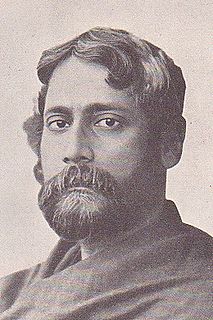
Jodi Tor Dak Shune Keu Na Ase Tobe Ekla Cholo Re, commonly known as Ekla Cholo Re, is a Bengali patriotic song written by Rabindranath Tagore in 1905.

Satyendranath Tagore(; Bengali: সত্যেন্দ্রনাথ ঠাকুর; [ʃɔtɛndronatʰ ʈʰakur]) was the first Indian to join the Indian Civil Service. He was an author, song composer, and linguist, and made a significant contribution towards the emancipation of women in Indian society during the British Raj. He was the second eldest brother of Rabindranath Tagore, the only Indian to get a Nobel Prize in Literature.
The Tagore family, with over three hundred years of history, has been one of the leading families of Calcutta, India, and is regarded as a key influence during the Bengal Renaissance. The family has produced several persons who have contributed substantially in the fields of business, social and religious reformation, literature, art and music.
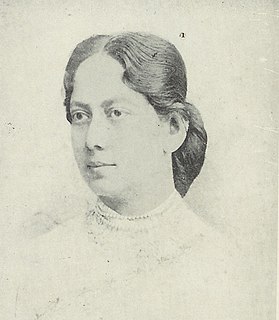
Swarnakumari Devi was a poet, novelist, musician and social worker from the Indian subcontinent. She was the first among the women writers in Bengal to gain prominence.
Gaganchandra Dam, mostly known as Gagan Harkara was a Bengali Baul poet after the tune of whose famous song "Ami Kothay Pabo Tare" Rabindranath Tagore composed "Amar Shonar Bangla", the national anthem of Bangladesh.
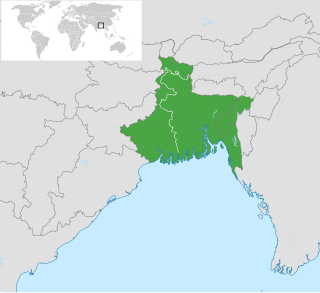
Baṅgamātā, Mother Bengal or simply বাংলা/ Bangla, a personification of Bengal, was created during the Bengali Renaissance and later adopted by the Bengali nationalists. In Bangladeshi poetry, literature and patriotic song, she has become a symbol of Bangladesh, considered as a personification of the Republic. The Mother Bengal represents not only biological motherness but its attributed characteristics as well – protection, never ending love, consolation, care, the beginning and the end of life.
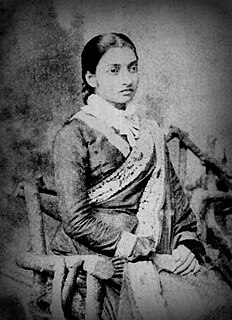
Jnanadanandini Tagore was a social reformer who pioneered various cultural innovations and influenced the earliest phase of women's empowerment in 19th century Bengal. She was married to Satyendranath Tagore, a scion of the Jorasanko Tagore Family.

Mrinalini Devi was a translator and the wife of Nobel laureate poet, philosopher, author and musician Rabindranath Tagore. She was from the Khulna district, where her father worked at the Tagore estate. In 1883, at the age of nine or eleven, she married Tagore.

Rathindranath Thakur was an Indian educationist and agronomist. He served as the first vice-chancellor of Visva-Bharati University, which was founded by his father, Rabindranath Tagore. Tagore's tenure at the university was marred by allegations of financial impropriety and an extra-marital affair.
Megh o Roudra is a Bengali drama film directed by Arundhati Devi and produced by Ajitesh Bandopadhyay based on Rabindranath Tagore's short story by the same name. This film was released in 1969 under the banner of K.L. Kapur Productions.
The following is a list of notable people associated withVisva- Bharati University and/or Santiniketan, a neighbourhood in Bolpur city in West Bengal, India:

Prabhat Sangeet is a collection of Bengali poetry by poet Rabindranath Tagore. The book was first published in 1883 and was followed by Tagore's earlier work Sandhya Sangeet (1881). This works also marks the end of the second stage of Rabindranath Tagore's poetic career.















